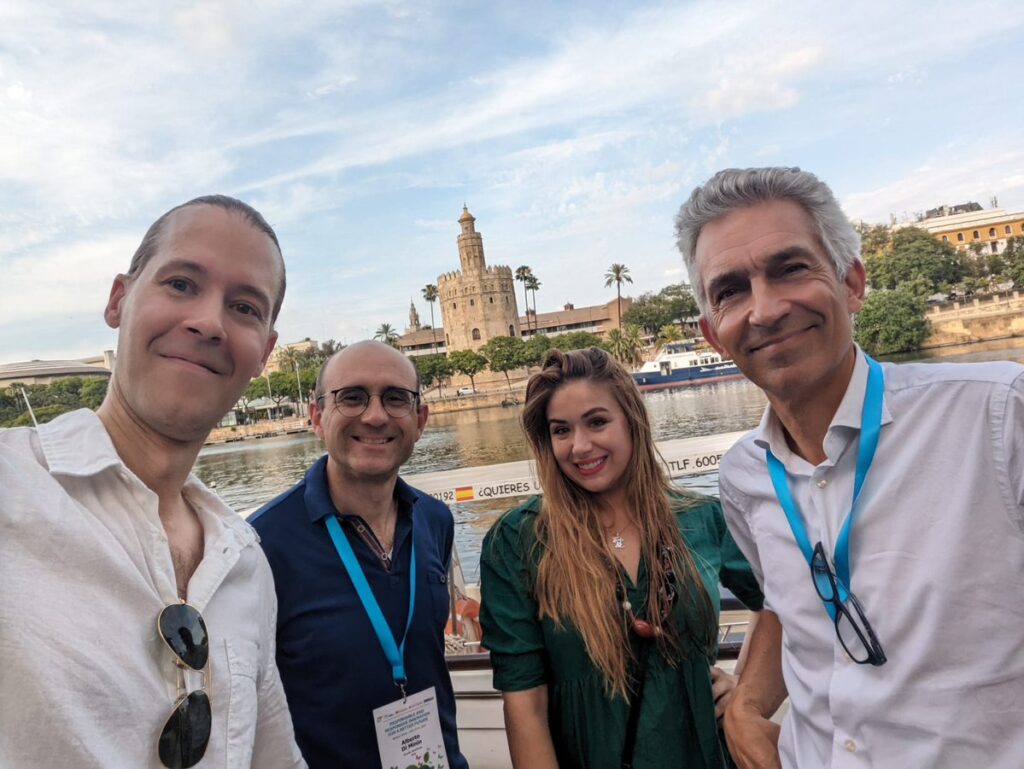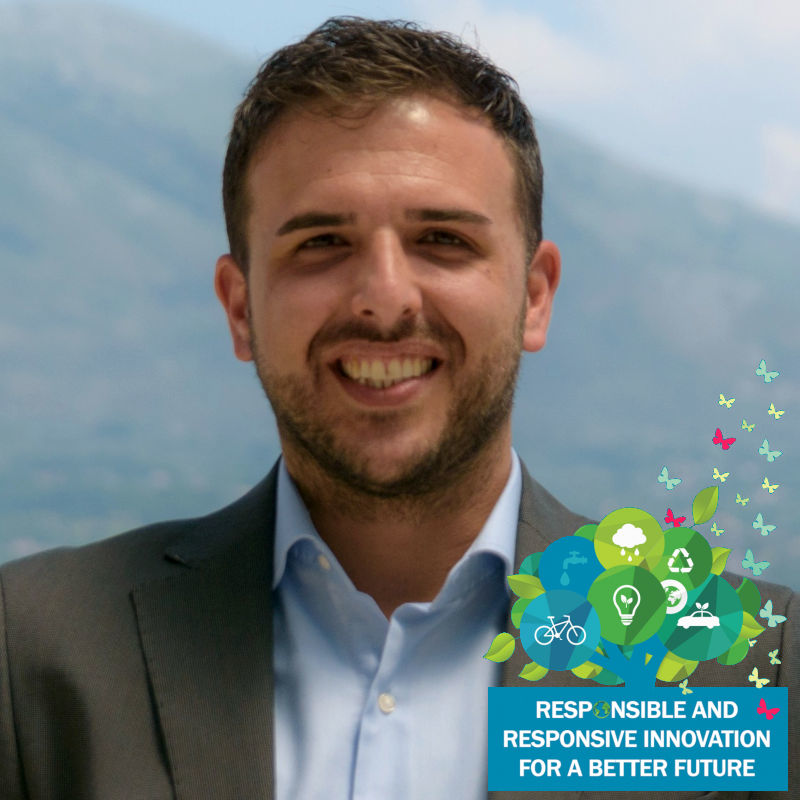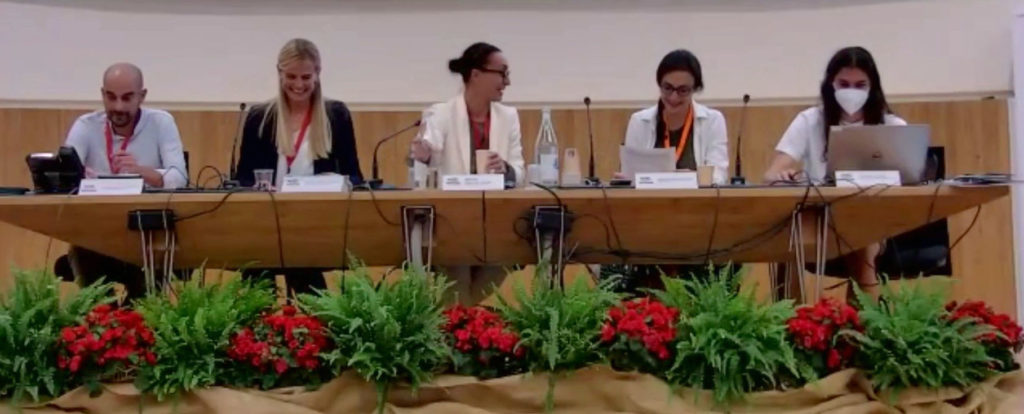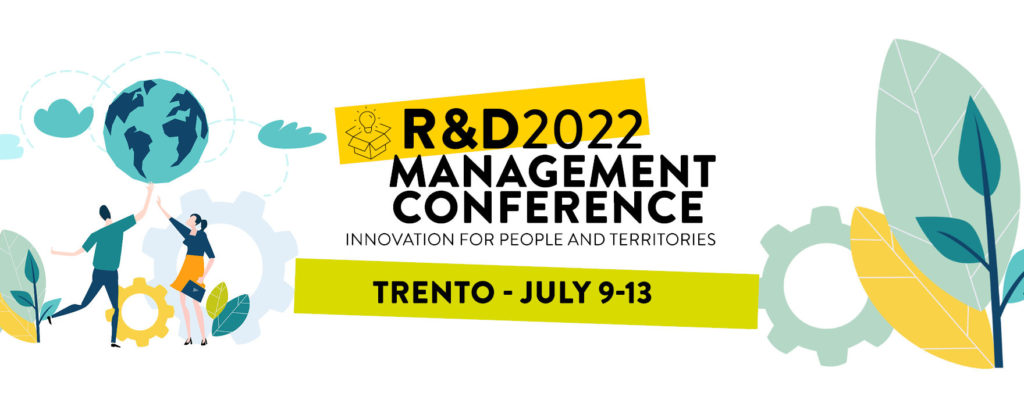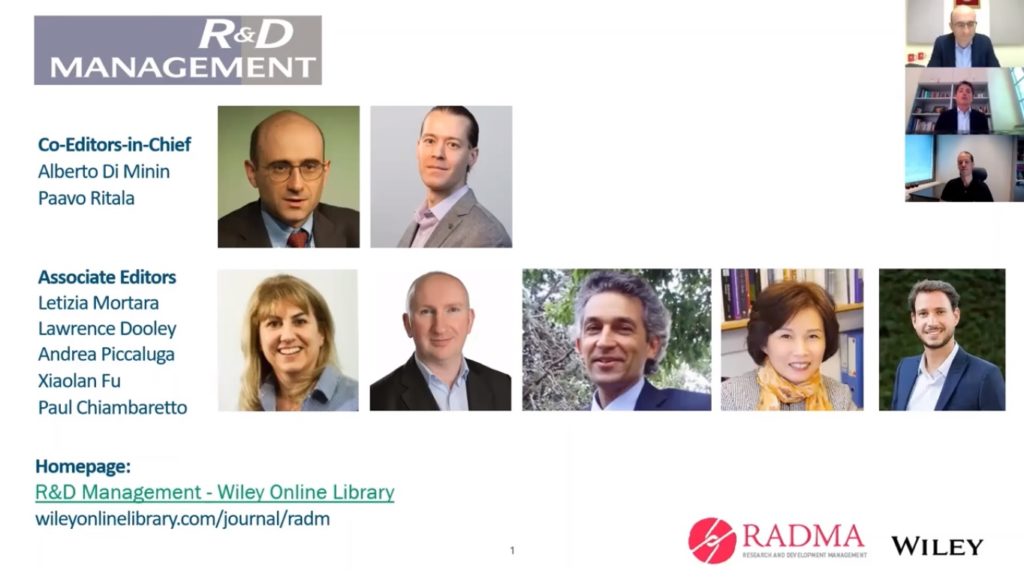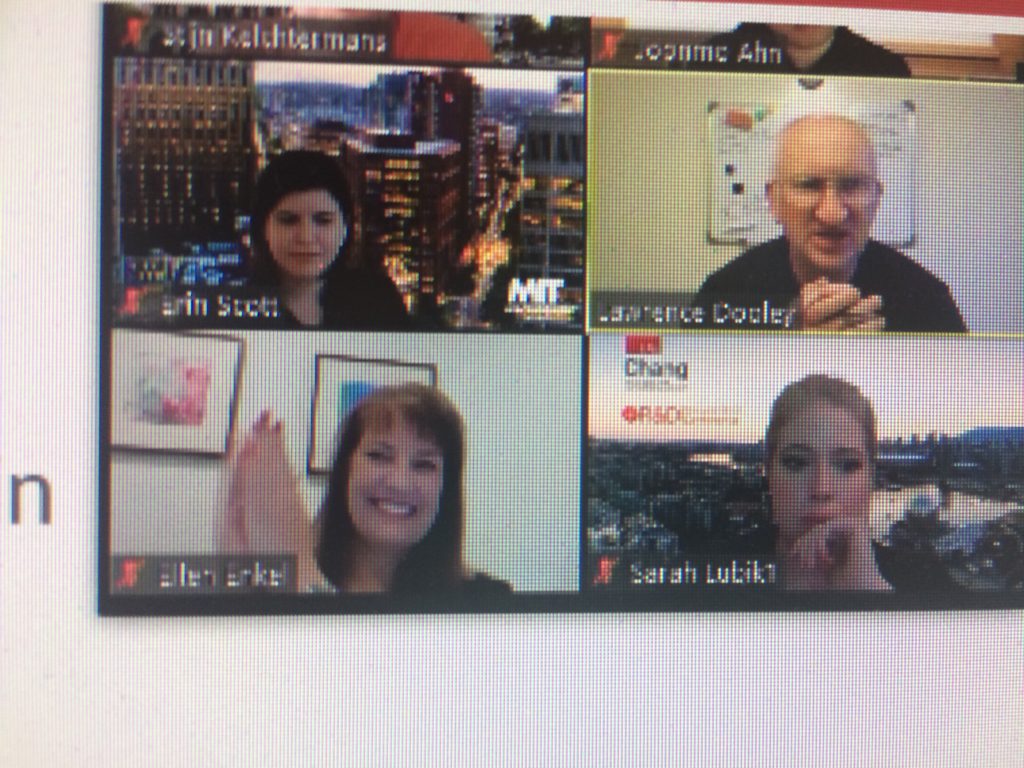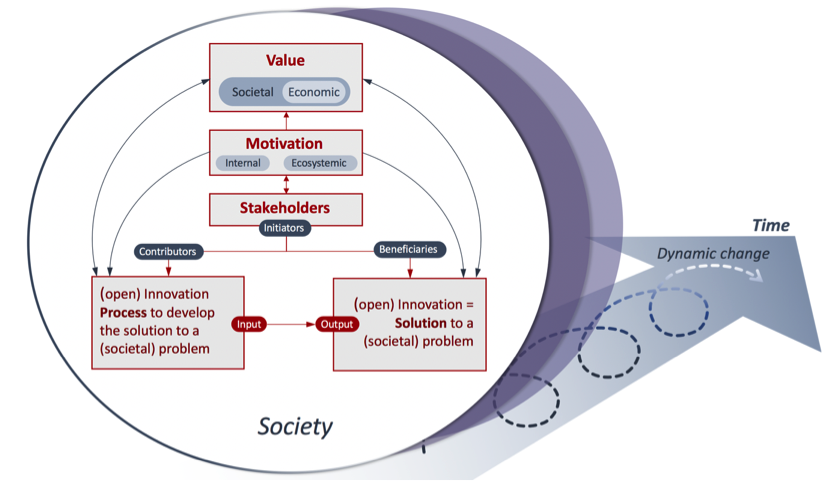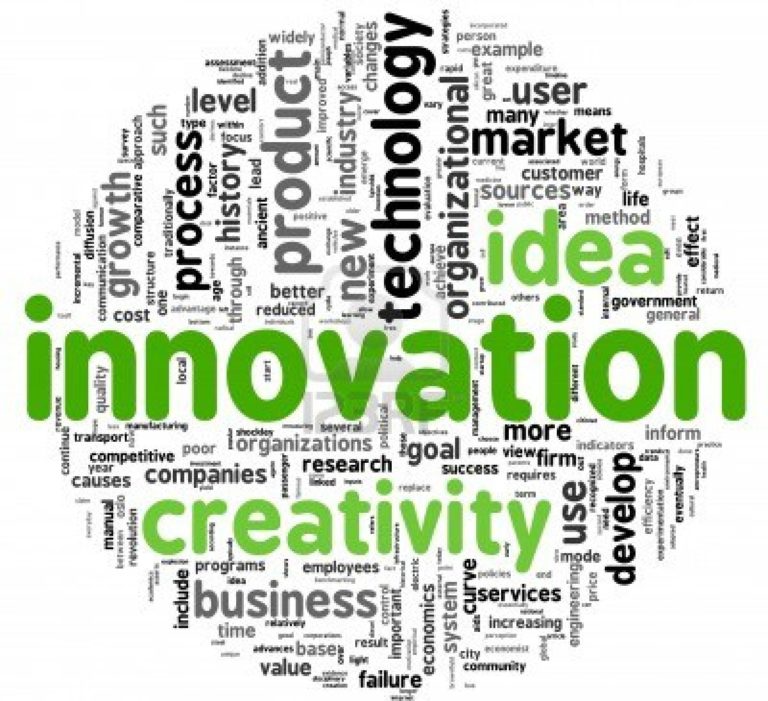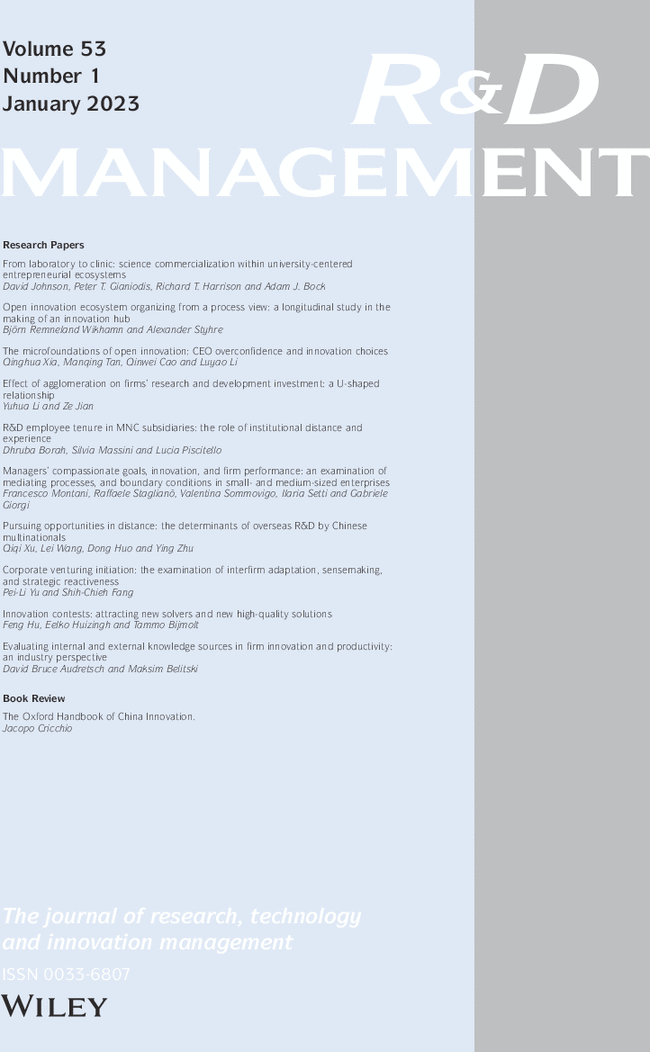
R&D Management publishes articles which address the interests of both practising managers and academic researchers in R&D and innovation management. Covering the full range of topics in research, development, design and innovation, and related strategic and human resource issues – from exploratory science to commercial exploitation – articles also examine social, economic and environmental implications.
RADMA along with WileyBlackwell is proprietor of the R&D Management Journal – the journal of research, technology and innovation management. ISSN 0033-6807. The R&D Management Journal is published in five issues per year.
For more information or to submit a paper please visit the Journal’s website by clicking here.
Take a look at the open calls for papers on the journal website.
Scope of publication
Traditionally, R&D management has been concerned with the choice of project and resourcing the research, but increasingly the scope has been extended to examine other ways of developing and acquiring technology. This has involved forming partnerships and alliances, with other organisations and academic institutions.
RADMA aims to support the development of this discipline which encompasses a number of key themes:
- Ideas screening
- Intellectual Property development and management
- Time to market improvement
- Technology transfer
- Project selection
- Project management
- Environmental scanning
- Open innovation
- Systematic process development
- Encouraging involvement of all functions
- Overlapping and parallel working
- Appropriate management structures
- Cross functional team working
- Emphasis on learning and development
- Early supplier involvement
- Involvement of leading edge users in product development
- Flatter, more flexible organisation structures
- Development of internal databases
- Effective external data links
RADMA is keen to develop best practice in these areas by sharing academic insights and practitioners experience.
R&D Management Editorial board
Co-Editors-in-Chief
Prof. Alberto Di Minin, Scuola Superiore Sant’Anna
Prof. Paavo Ritala, LUT University
Associate Editors
Prof. Joon Mo Ahn, Korea University
Dr Paul Chiambaretto, Montpellier Business School
Dr Lawrence Dooley, University College Cork
Prof. Xiaolan Fu, University of Oxford
Dr. Letizia Mortara, University of Cambridge
Prof. Andrea Piccaluga, Scuola Superiore Sant’Anna
Dr. Krithika Randhawa, University of Sydney
Book Review Editor
Irina Saur-Amaral, University of Aveiro
50th Anniversary – All Time Top 10 Cited Articles
- Beyond high tech: early adopters of open innovation in other industries. Chesbrough, H; Crowther, AK (2006)
- Investigating the not invented here (NIH) syndrome – a look at the performance, tenure and communication patterns of 50 R&D project groups. Katz, R; Allen, TJ (1982)
- Successful industrial innovation – critical factors for the 1990’s. Rothwell, R (1992)
- Open R&D and open innovation: exploring the phenomenon. Enkel, Ellen; Gassmann, Oliver; Chesbrough, Henry (2009)
- The future of open innovation. Gassmann, Oliver; Enkel, Ellen; Chesbrough, Henry (2010)
- Opening up the innovation process: towards an agenda. Gassmann, O (2006)
- Challenges of open innovation: the paradox of firm investment in open-source software. West, Joel; Gallagher, Scott (2006)
- Toolkits for idea competitions: a novel method to integrate users in new product development. Piller, FT; Walcher, D (2006)
- The role of technology in the shift towards open innovation: the case of Procter & Gamble. Dodgson, M; Gann, D; Salter, A (2006)
- The “making” of an entrepreneur: testing a model of entrepreneurial intent among engineering students at MIT. Luthje, C; Franke, N (2003)
Source: WileyBlackwell.
Related posts
Successful digital healthcare innovation is not about selling a product – it is about convincing a whole ecosystem that the new technology is safe, valuable, and fits into their daily work.
Agile can be defined as a capability – a rapid response to turbulent markets, changing business requirements and advances in technology. Although more widely discussed in the context of the software industry, researchers Alexander Kock and Andre Meier identified a growing phenomenon for R&D Units to adopt agile principles.
Applying traditional product development metrics in the early stages of a radical innovation project can be very damaging. They are based on the assumption that the alternative is the status quo, however a more realistic scenario is a deteriorating competitive and financial future.
Oceania researchers involved in exciting research on R&D and innovation management, strategy, and policy are to benefit from a new R&D Management Workshop 2024 in Australia
In 2020, R&D Management journal celebrated 50 years of publication. Co-Editor Paavo Ritala conducted a comprehensive analysis of the journal’s past five decades and looked towards the future in the R&D management field.
Development of the circular economy is stalling, according to Benito Mignacca, University of Cassino and Southern Lazio. He argues that a lack of collaboration between key players is hindering the transition to more sustainable development and that greater adoption of open innovation strategies could increase the uptake of re-use initiatives.
The rapid digitisation of services during Covid now means that it is not possible to fully participate in the socioeconomic community without a smartphone, resulting in the disenfranchisement of sections of the population.
An exclusive range of sunglasses promoted at the 2020 Tomorrowland festival were produced from recycled bottles and created using 3D printers by Yuma Labs. The intersection between digital technologies and the circular economy is the theme for an R&D Management Special Issue.
Do you want to get published? Then keep it original and appropriate for the readership of the journal. Editors from a range of prestigious publications gave their advice at the R&D Management Conference 2022 and a number of common themes emerged.
Leading journals will be participating in the tracks at the R&D Management Conference and several have special issues based on the theme of the track.
There are four broad themes and 38 tracks planned for the three days.
Traditional organizations start to face diseconomies of scale, scope, and learning as they grow. You know the stuff. But AI allows the modern giga-platform companies to grow at unprecedented pace and the it seems that there are very little limits to scalability. Read the book to understand why!
R&D Management has announced its two new Co-Editors-in-Chief Alberto Di Minin and Paavo Ritala, they are supported by an editorial team with significant experience in both academic and commercial spheres of R&D and technology management.
An Entrepreneurial Ecosystem (EE) is known to stimulate entrepreneurship, innovation and technological development. The R&D Management journal has opened a special issue call for papers on this topic to explore their role in technological and social change.
Choosing the best conference papers from the R&D Management Symposium was a difficult job says Dr Lawrence Dooley, University of Cork, one of the judging panel that also included Prof Ellen Enkel University of Duisberg, Essen, Dr Letizia Mortara, University of Cambridge and Prof Paavo Ritala
“We are reviewing how innovative SME’s have changed their strategies over the last 100 days, says Alberto Di Minin. “This has given me hope.” As Europe adapts to the ‘new normal’ there is evidence that knowledge-based companies are rising to the challenges.
The sustainability of the media industry is one of the issues that is of interest to Paavo Ritala, Professor of Strategy & Innovation at LUT University. The COVID-19 crisis has shown that information provider and ‘watch-dog’ are among the many roles that that media has. Paavo talks about his research interests and his current project #MediaContradictions.
The current global challenge has provoked interesting approaches to innovation – from collaborative working and open innovation, to crowdsourcing and repurposing of labs and equipment. If you have some interesting examples – then R&D Management has a call for papers for its special issue
Innovation for sustainability is a way for firms to improve their competitiveness while also facilitating the greater good – but both facilitating and constraining forces are at play for businesses to actually adopt such a role.
How could open innovation (OI) collaborative practices provide a way to tackle the world’s most pressing societal challenges – eradication of disease? Reduction of carbon emissions? Creation of more sustainable products and services? A special issue of R&D Management investigates this proposition from a number of perspectives and provides insights into how current open innovation […]
Your approach to Open Innovation should be defined by the corporate strategy, say Professor Ellen Enkel. A defender’s strategy needs a different approach to a prospector and culture will eat strategy for breakfast if you don’t selected the right people. She gives her 5 tips for success.




